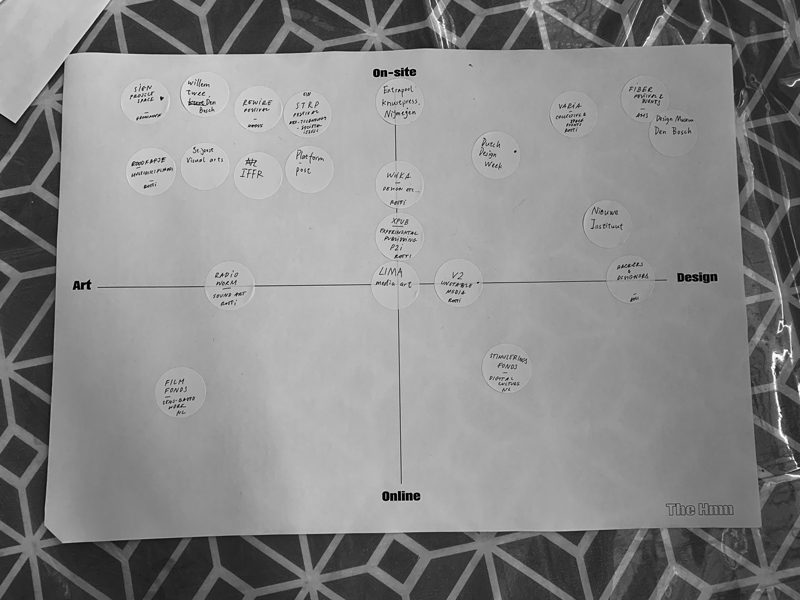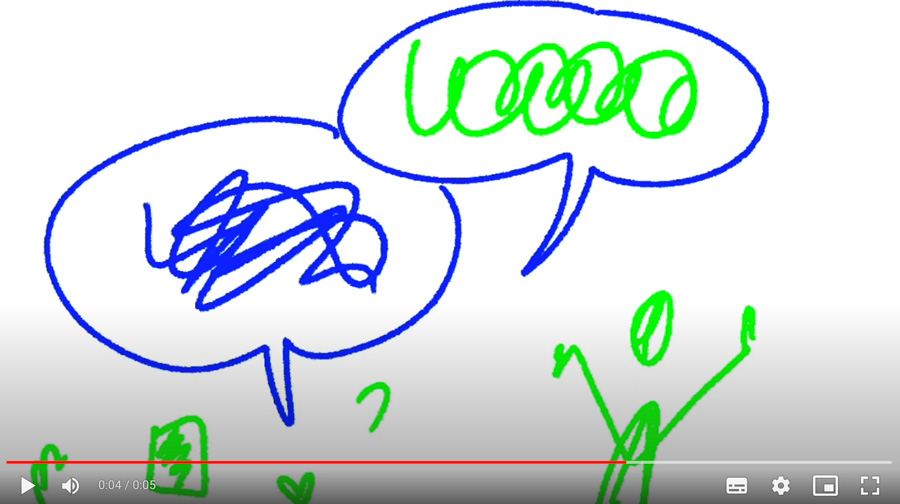FYI Talent Program
_still work in progress_
// about
// the programme
FYI Emerging Digital Maker Program 2023
The FYI Emerging Digital Maker Program is designed to teach you about the digital culture ecosystem in the Netherlands and how you can develop your professional art practice within it. This includes not only developing your own practice, building a network, and presenting your work, but also learning about working conditions, your rights as a cultural worker, and different avenues for subsidies and financial support. Taking the form of seven intimate sessions and three studio visits, you’ll have the opportunity—together with 25 other emerging makers in digital culture—to learn from experienced mentors and professionals in the field.
Organised by The Hmm. Supported by the Creative Industry Fund.
// location
Framer Framed, Amsterdam
Framer Framed is a platform for contemporary art, visual culture, and critical theory & practice. Each year the organisation presents a variety of exhibitions alongside diverse cultural and educational programs at its main location in Amsterdam Oost, as well as its project space Werkplaats Molenwijk in Amsterdam Noord. With the belief that critical and contextualised programming is best explored with an open door and low threshold, Framer Framed’s public programs are always free of charge and resources are made readily available to emerging and established local and transnational communities, artists, and curators to turn their own ideas into tangible realities. Framer Framed regularly commissions and co-produces new artworks and publications, organises international projects, and houses a bookshop and open reading space.
▶▶ website
// mapping the scene
📍 6-10-2023 // @Framer Framed, Amsterdam
_summary
During this session, we had an introduction to the history of digital culture in the Netherlands & some reflections on what exactly it is (to us), facilitated by Lilian Stolk (co-founder of The Hmm). Afterwards, we did an elaborate brainstorming about institutions, education, festivals and funds that work in the same field. Altogether, we made a visual map and discussed what is our personal experience with them.
_highlights
We collected places in four categories: institutions, funds, festivals, and education. On my end, I have experience with a very small batch of those, but here are some that I've mapped during the last two years (the list is work in progress):
education xpub (experimental publishing) / wdka (willem de kooning academy
institutions
(including spaces, galleries, museums, even collectives)
Rotterdam: WORM / Varia / Roodkapje /
Groningen: SIGN project space /
Nijmegen: Extrapool /
festivals
FIBER / STRP / Rewire festival / Sounds of music /
funds Together with Erica (xpub) we started researching this last year, ▶▶ here is our summary so far.
Also, here is my personal research since I've moved to the Netherlands: ▶ art scene in NL
// writing about yourself and your practice
📍 20-10-2023 // @Framer Framed, Amsterdam
This session was cancelled in order to support the strike against the war in Palestine.
Instead, we got it as homework - we received a detailed presentation made by Margarita Osipian from the Hmm. In it, she explained good practices and ways to write your bio and artist statement. By analysing various examples, she showed to us some useful ways to approach this impossible task :D
Here is my tryout!
Bio:
i am an artist, designer, and facilitator. i experiment with mediums such as visual, digital, and sound art. recently finished my master’s programme in fine art and media design: experimental publishing at the piet zwart institute in rotterdam. in the context of my master's research, i aimed at finding accessible entry points for other visual makers to use sound in their research and artistic work. in my practice, i weave diverse lines of work and disciplines - artistic research, collaborative practices exploration, publishing, documentation, and addressing socially-charged themes with a mixture of mediums.
Artist statement:
my artistic style is experimental and laboratorial. i am constantly trying out various techniques and stylistic approaches. many of my works are always work in progress and i don’t need something to be fully finished before i publish it. i value imperfection, small details, errors, and intuitive decisions when visualising complex concepts - very much in the concept of diy & diwo culture. anything that makes the artwork human. currently, i am interested in mixing different mediums and experimenting with visual, digital, and sound art. my latest research focus goes to ways to create collective sound-based publications.
// presenting
📍 27-10-2023 // @Nieuwe Instituut, Rotterdam
First, we visited the REBOOT exhibition at Het Nieuwe Instituut and had a tour by Sanneke Huisman (▶▶LI-MA) who told us how they co-organised and curated it. Afterwards, we had a presentation workshop, facilitated by ▶▶Merel Boers.
_highlights:
🖤 The session was the most gentle towards the participants on this topic I've ever attended. The most dramatic comparison I can do is with the pitching sessions I attended back in 2012-2013 when I was part of a startup and we were part of a startup accelerator mentoring programme. Usually, when it comes to presenting, you are pushed to your limits, into a very uncomfortable zone and many people struggle there. The Hmm's session led by Merel was careful, she left space for anyone to say "No" and gave space to whoever wanted to try speaking in front of everyone.
▲ Merel paid a lot of attention to how we give feedback (so important and so overlooked in my experience). She advised us to focus on how we feel as a viewer and on how/why/when did we feel connected to the speaker. Such feedback can help them improve rather than point out what went wrong.
💭 I've been thinking: Being careful and gentle when giving feedback is essential not to traumatise the other person and not to turn them into defending mode. It's an art to give feedback in a really meaningful way. However, you still need to deliver the bad news and you cannot always treat people with feathers either. I think, looking for this fine balance is essential - being conscious about how much you can tell, how, and most importantly - to whom.
▲ During this workshop, all the selected speakers at REBOOT had the chance to present and exercise. I loved hearing more about others' work and us being on their team to help them improve their presentations.
// archiving digital art
📍 10-11-2023 // @LI-MA, Amsterdam
This session took place at LI-MA's space in Amsterdam. We were warmly welcomed by Theus Zwakhals and Joost Dofferhoff who made two presentations about different aspects of the way they deal with digital art.
★ Theus shared insights about distribution of the digital art. He also talked us through the history of digital art in the Netherlands and LI-MA.
★ Joost talked with passion about his work, sharing many insights on how digital art is documented and preserved.
_highlights:
🖤 They were really generous in sharing insights about their process and work. Kindly answering our questions and also taking us to their studio where we could see different mediums for digital content, how they read them, copy, restore, and preserve. Their library is also quite impressive, of course.
↯ Sadly, they don't have space to store physical components, in case the artwork is mixed-medium made and that is a bit limiting the variety of works they can archive.
▲ You can get in touch with them, if you want to submit an artwork. Have in mind, they accept only works that are created by Dutch artists or in the physical realm of the Netherlands. You can simply send them an email and will receive feedback if your works fits into the LI-MA collection.
▲ For documentation and preservation, an important part of their job is to keep older machines working, so the works can be viewed in the original environment they were made for before digitising and transforming them into other formats. Just imagine how many different machines from the past 50 years are there!
🖤 Back in the 2000s (I think) they were sending newsletters with digital works in the form of DVDs. You can see most of them in their library.
// The Hmm @REBOOT
📍 15-11-2023 // @Nieuwe Instituut, Rotterdam
▶▶The Hmm @ REBOOT brings together eight artists, designers and researchers across generations, who are working with and reflecting on digital tools, online identities, and the deep impact of internet culture. During this special program in collaboration with Nieuwe Instituut, we’ll be highlighting three generations of makers. From the exhibition REBOOT, we invite the pioneers of digital art (1960-2000), and present-day makers who responded to their works. Finally, we present emerging young artists, designers, and makers from our Hmm FYI Emerging Digital Maker Program.
For this event, I collaborated with Léa Cadieux - we met during the FYI Talent Program, organised by the Hmm. We came up with a proposal to present our works in a joint presentation at the then-upcoming The Hmm @Reboot event. We collaborated on our presentation proposal before we got the chance to meet in person. We figured that both of us had very different outcomes from our work, yet we found that we had very similar processes. And values. We collaborated on an etherpad and exchanged messages in a chat. Our proposal was accepted by the programme organisers and we got the chance to present at the event <3 Here is the first cut of what we came up with - what we had in common in the way we work, which we called ▶Protocol of collectiveness.
// grant writing
// references & links
_references that are connected to the programme or some reads that I am checking out [and are connected to the topic]
★ The Hmm
★ Framer Framed
★ LI-MA
★ Post-Precarity Zine
★ Janwillem Schrofer and Wendy Van Os-Thompson (2018). Plan and play, play and plan : defining your art practice. Amsterdam: Valiz.
★ Nav Haq and Pascal Gielen (2020). The aesthetics of ambiguity. Understanding and addressing monoculture. Amsterdam: Valiz.

